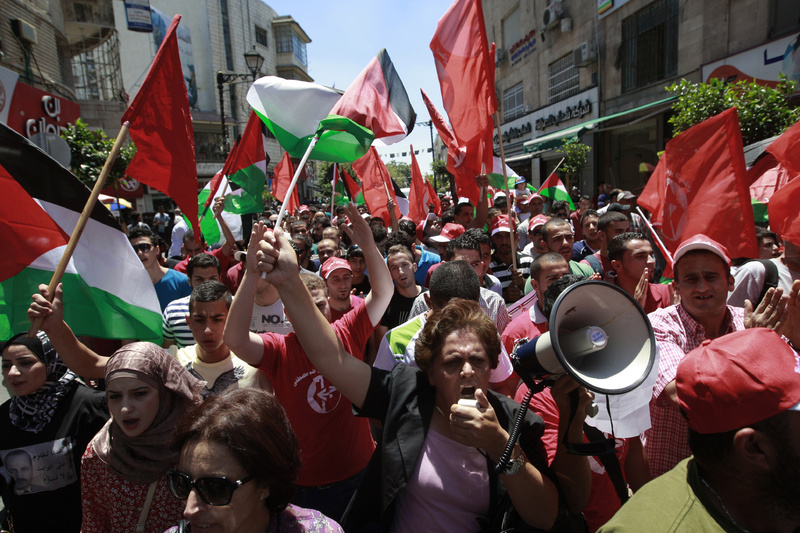JERUSALEM – The Obama administration announced that the first substantive peace talks between Israel and the Palestinians in years will begin Monday evening in Washington, after Israeli leaders agreed Sunday to release 104 Palestinian prisoners.
State Department spokeswoman Jen Psaki announced that the preliminary talks will be led by Israeli Justice Minister Tzipi Livni and Palestinian chief negotiator Saeb Erekat.
Earlier Sunday, calling it “painful for the entire nation,” Israeli Prime Minister Benjamin Netanyahu won a vote in his divided cabinet to release the Palestinian prisoners, many convicted of killing Israelis, in order to restart peace talks brokered by Secretary of State John Kerry.
The list of prisoners who may be released in coming days includes Palestinian militants who threw fire bombs, in one case at a bus with children aboard; stabbed and shot civilians, including women, elderly Jews and suspected Palestinian collaborators; and ambushed and killed border guards, police, security agents and soldiers. All of them have been in prison prior to 1993; some were serving life sentences.
The Israeli public considers them terrorists with blood on their hands. Palestinians see them as freedom fighters struggling to reclaim their homeland and oust the occupiers. Palestinian Authority President Mahmoud Abbas and his leadership refused to return to the negotiating table without their release.
Whether it was a grudging gesture of goodwill, diplomatic blackmail or something in between, Netanyahu made a major concession to Kerry and the Palestinians.
In a sign of how divided Israel and this coalition government is, the vote among Netanyahu’s cabinet ministers to release the prisoners was 13 to 7, with two abstentions.
In a parallel move, the Israeli cabinet also approved Netanyahu’s call for a national referendum that would allow Israeli voters to approve or reject any peace deal he makes.
Israeli officials said the prisoners will be released “in stages” four times over the next nine months, with the first release to take place soon after the initial talks in Washington this week.
Erekat called it “a step toward peace,” and said, “I hope that we can use this opportunity that the U.S. has provided for us to resume negotiations,” according to the Associated Press.
More prisoners would be freed as negotiations continue, although Netanyahu warned that “every Palestinian provocation will result in halting of the prisoner-release process.”
The prime minister called the prisoners he was about to release “depraved people, even if most of them have been in prison for over 20 years.”
This was not the first time Netanyahu has struck such a deal. In 2011, the Israeli government traded 1,000 Palestinian and Arab Israeli prisoners for the release of Gilad Shalit, an Israeli soldier abducted by Hamas militants near the Kerem Shalom crossing into the Gaza Strip in 2006. He had been held for five years.
NO FREEZE ON SETTLEMENTS
In an “open letter to Israeli citizens” published Saturday night, Netanyahu explained, “this is an incomparably difficult decision, it is painful for the bereaved families and it is painful for the entire nation and it is also very painful for me.”
While most polls show a majority of Israelis support the peace process, releasing prisoners is unpopular across the political spectrum.
“From time to time, prime ministers are called on to make decisions that go against public opinion — when the matter is important for the country,” Netanyahu said in the open letter. “(I)t seems to me that it is very important for the State of Israel to enter into a diplomatic process.”
The prime minister said dramatic changes in the Middle East — in Egypt, Syria and Iran — not only create challenges, but “considerable opportunities for us” to strike a deal.
Netanyahu stressed that while he agreed to release prisoners, and only after talks begin, he rejected a Palestinian demand that he announce a freeze on new construction in the Jewish settlements in the West Bank.
According to Israeli media, Netanyahu told Kerry that over the next nine months, as many as 1,000 new units may be approved for construction in West Bank and East Jerusalem settlements.
Netanyahu was silent on a third Palestinian demand — that negotiations about borders for a future Palestinian state begin with the pre-1967 armistice lines.
Qaddura Fares, president of the Palestinian Prisoners’ Society, welcomed the prisoner release as “the right decision for negotiations.”
“It will only help to create an atmosphere of calm. It shows that the state of Israel really does want peace,” he said.
Fares warned, however, that the prisoners must be released to their homes — that a prisoner who hails from Ramallah not be expelled into the Gaza Strip.
PROTESTERS GATHER
The Palestinian prisoners have all been held since the signing of the 1993 Oslo Accords, which created interim and limited self-government for the Palestinians and Israeli military withdrawal from the West Bank and Gaza Strip. Israel pulled out of Gaza in 2005.
Because the crimes date to the 1980s and 1990s, in an era before suicide bombing became a widespread tactic by Palestinians, the attackers used molotov cocktails, knives, guns and grenades in their attacks. Many of the attackers were members of Abbas’s Fatah Party and their targets were soldiers.
As Netanyahu and his cabinet debated the release, a few hundred protesters gathered outside of the prime minister’s office and waved signs illustrated with bloody palm prints.
Send questions/comments to the editors.



Success. Please wait for the page to reload. If the page does not reload within 5 seconds, please refresh the page.
Enter your email and password to access comments.
Hi, to comment on stories you must . This profile is in addition to your subscription and website login.
Already have a commenting profile? .
Invalid username/password.
Please check your email to confirm and complete your registration.
Only subscribers are eligible to post comments. Please subscribe or login first for digital access. Here’s why.
Use the form below to reset your password. When you've submitted your account email, we will send an email with a reset code.